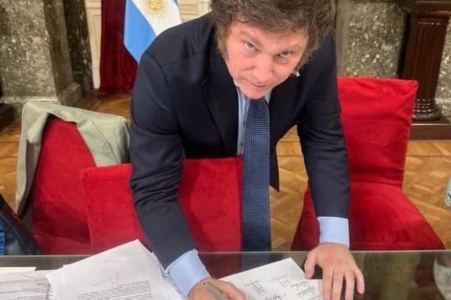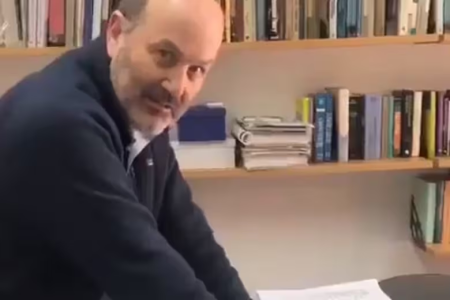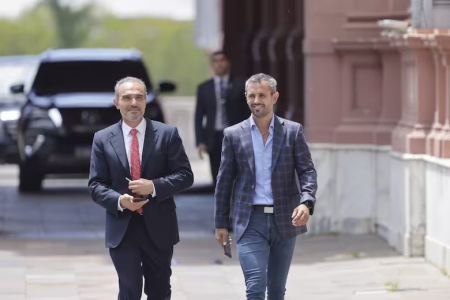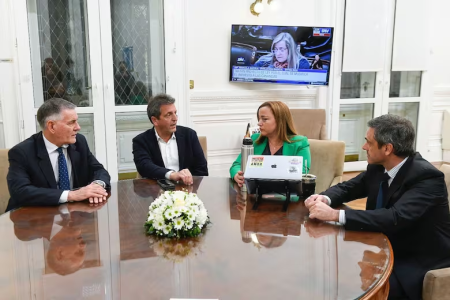The Government has the opposition in its own bowels - La Nación

Source:

 www.lanacion.com.ar
www.lanacion.com.ar
January 04, 2024

Milei signs the omnibus bill that he sent to Congress on Wednesday, December 27
a Libertad Avanza has formed its own opposition. These days the main obstacle that Javier Milei finds in achieving his goals is Javier Milei's method. The first measure of necessity and urgency that would be healthy for you to adopt is to produce a change in your conception of the task of government. The main impediment is quite evident. The President decided, with very good judgment, that the most important goal of his administration would be to reduce inflation as soon as possible. To do so, he organized a major adjustment fiscal. This shock depends largely on a battery of tax changes that, by definition, require parliamentary approval. That's why he sent a bill to Congress. However, An incomprehensible distraction led him to include these modifications in a text of 664 articles whose treatment, if done at full speed, would take half a year.Before Milei arrived at the Casa Rosada there was a very reasonable doubt about how he would get the Legislative Branch to approve his initiatives. Now the question is more rudimentary: it is no longer a question of whether she wants to approve them, but rather whether she can deal with them. It is not a tangential drawback. If it depends on the tax package sent to the Chamber of Deputies, the essential normalization of public accounts will take too long to occur.In other words: those who try to foresee the fiscal course of the ruling party must include in their arithmetic the delay involved in giving legislative treatment to a 183-page tome.
The problem just described is not due to a formal error. It expresses a conception according to which public management is the mechanical application of a laboratory recipe. That is to say, a technique that can dispense with the consensus essential for initiatives to become viable. Regardless of the passable authoritarianism that shelters this way of seeing the administration , not even revolutions make reality appear so docile in the face of ideas.

Sturzenegger and the package of state reform measures
A second difficulty appears in Milei's program: that of distinguishing the main from the accessory. It is a striking feature of the unfathomable project sent to Congress and the Decree of Necessity and Urgency prepared by Federico Sturzenegger and monitored, at the request of Santiago Caputo, by María Ibarzábal. Not only are the priorities of the Executive Branch not identified. Nor is it understood why some matters went to the law and others to the decree. As if the same team had come to power with two management plans.
Milei has her sights set on a purpose. Reverse the price race. He believes that the real exchange rate will have an abrupt decline in the coming months. If an index of 100 is assigned to December 2016, that exchange rate reached 180 last month. Next February it would fall to 157; in April, at 140 and in June it would be at 110. This prediction means that for the President, inflation in January would be around 16%, in February 15%, in March 14% and in April it would have already returned to single digits, with something similar to 8%. This is the thesis that underlies another official hypothesis: with this drastic slowdown in prices, a greater devaluation than expected would not be necessary. On the contrary: there would be a revaluation of the peso, encouraged by the influx of dollars that will determine the harvest.
These goals assume that the Treasury will no longer be financed with monetary issue. Therefore, in addition to reducing expenses, the Government must obtain financing through taxes. Here lies the importance of the law that Congress must discuss. Here lies the seriousness of the delay in your treatment.
The Executive Branch is asking Parliament to modify the Personal Property Tax and the internal tax regime; that authorizes a money laundering and a moratorium; to tweak the VAT law; and that alters the formula for updating pensions, among other changes.
These reforms are part of the same articles with alterations in the Federal Fisheries Law, the Hydrocarbons Law and the Administrative Procedures Law. Reforms are proposed to the Civil Code and the Penal Code. And, with the same degree of relevance, changes in the National Film Institute, the Book Law, the Mutual Associations Law and the Theater Institute.

President Javier Milei's meeting with legislators ended. Martín Menem retires.Santiago Filipuzzi - LA NACION
The most curious thing is that these remodelings are led by the declaration of a dramatic emergency that would last at least two years. What administration that burns in the flames of an emergency is dedicated to improving the resale of sports tickets or to consider, as these projects do, the convenience of maintaining a National Fund for the Arts? Who is going to accept that if these changes are not addressed, the country will succumb to hyperinflation?
This confusion of priorities becomes more striking when the gaps in the program are noted. For example, resources are being withheld from the Popular Libraries but the scandalous protection regime for importers from Tierra del Fuego is maintained without any variation, on the that the President said a little over a year ago that it was “an affront to good Argentines.”
As pointed out almost lovingly Marcelo Figueras in The Rocket to the Moon< a i=4>, these initiatives have the air of a letter to the Three Wise Men written by officials who decided to turn into reality in an instant what they fantasized about for a lifetime. In strictness, it is about an unpublished genre: the wikiley.A normative body developed with the Wikipedia system, where each user can add what happens to him.
It is natural that a reform of that size takes a lot of time from legislators. Added to this limitation is a problem of parliamentary technique. How many committees should the text go to? What is the head commission, that is, the one that regulates the entire task? It hasn't been decided yet. At this point the ruling party runs into another problem: a disturbing lack of experienced deputies and senators to command the entire operation.
The unfathomable breadth of this legislative undertaking, which includes Sturzenegger's DNU, does not only pose a methodological difficulty. The main challenge is political. When so many subjects are incorporated, unexpected conflicts arise. An example: governors who were willing to collaborate with their deputies in the approval of the fiscal project, now set conditions because they are harmed by unforeseen items, such as fishing or hydrocarbons. Without going to more basic imprudence. For example, a President in a notorious parliamentary minority treats those who resist approving an article as “coimeros”. Maybe it's not untrue. But there is a lack of prudence.

Arrival of ministers at the Casa RosadaRicardo Access
These contradictions that appear in legislative management are reproduced in broader fields. It is true that Milei believes that a contractionary fiscal and monetary policy is enough to defeat inflation. That is to say, that warning from the neo-Keynesian Franco Modigliani, must be nauseating for those who try to stop the price race only with monetary and fiscal instruments It is like trying to stop a car that is traveling at 200 kilometers per hour by grabbing it by the antenna. However, if at some point the President were to pull other levers, it is possible that he would be putting stones in his own way. For example: if he had to negotiate with the unions the salary update pattern of the next joint negotiations, and not entrust that variable only to the great recession that is coming, Sturzenegger's DNU would help very little. In fact, the CGT yesterday obtained protection in the labor jurisdiction, always prone to unionism, to save the employment contract system and, especially, the contribution regime to unions and social works, threatened by official deregulation. One of the chambermaids, Alejandro Sudera, argued citing Alberdi, Milei's inspiration. A case of lawfare, but oh well. Should these rules be modernized? Definitely. Is now the time? For Milei it is an inconsequential question because it seems pointless to intervene in salary policy, which he entrusts to the vagaries of the market. In case he changes his mind, the Minister of the Interior, Guillermo Francos, is carrying forward with Gerardo Martínez, Andrés Rodríguez and Héctor Daer a negotiation undermined by Sturzenegger and his organizational revolution.
In the '50s, Juscelino Kubitschek promised Brazil to change 50 years in 5. Milei, empowered by Sturzenegger, is more ambitious: aims to reverse a 100-year decline in just two weeks. This dream lacks a political strategy. In principle, she promises to aggravate the inconveniences. The President has a popularity of over 60%. That of the Government is around 57%. But both are exposed to the disenchantment of a very broad swath of the population, mortified by the general adjustment of the economy. The multiplication of conflicts only contributes to increasing the unrest over reforms that, although often desirable, may not be so timely. For example, the transformation of football clubs into public limited companies.
It is evident that the ruling party does not have a political team dedicated to weaving the network that supports the core of the economic program. Francos are facing this problem; the image strategist, Santiago Caputo; the general secretary of the Presidency, Karina Milei; and, in direct line with her, Eduardo “Lule” Menem, who, in addition to assisting his cousin Martín, the president of the Chamber of Deputies, is the person in charge of organizing La Libertad Avanza on a national scale. The main challenge of this group is to achieve that the President understands the relevance of his work.

The need and urgency to strengthen this flank will become more evident tomorrow, when the technicians of the International Monetary Fund arrive in Buenos Aires Luis Cubbedu and Ashvin Ahuja.< a i=2> They will begin to analyze the formulation of a new program for Argentina. But the first question they will ask will refer to the political sustainability of the Milei plan. There is a lot of expectation in the Government about this visit. Some officials contemplated that she could also travel Gita Gopinath, deputy director of the organization due to her status as representative of the United States.
The relationship with that country is going through an idyll that for the President is very promising. It is only clouded by a minimal detail: the difficulties for Gerardo Werthein to obtain the agreement of the Senate as ambassador. In Kirchnerism it was terrible that, in addition to having tax residence in Uruguay, it promotes his investments there. Especially because his partner, Gabriel Hochbaum, explained that they chose that country for its honesty, which distinguishes it from the rest of Latin America. These are not happy days for Werthein. His American godfather, Bill Clinton, is currently shaken by a scandal: Judge Loretta Preska, the same one who condemned Argentina for 16,000 million dollars for the nationalization of YPF, yesterday released documents in which the former Democratic president is mentioned more than 50 times< /span>who committed suicide in a New York jail in 2019.< /span>sex trafficking for his association with Jeff Epstein, a billionaire accused of
They are Werthein's headaches that are far from affecting relations with the Fund. The possible presence of Gopinath, which yesterday seemed ruled out, was of interest because the hierarchy of the delegation arriving from Washington could be an indication of the help that the country could receive at a time when the Bank Central lacks reserves. On this point there has been a notable lack of coordination between Luis Caputo and the President. When it was reported that some officials were speculating that the IMF, encouraged by the US Treasury, could offer $15 billion in aid, the economy minister issued a blunt denial. However, that same night, in a very informative interview with Luis Majul, Milei stated that her administration could well aspire to that credit. Caputo was unaware of that criterion, perhaps that desire, of his boss. The most striking thing is that in his refusal the minister called on the population to only obtain information through official websites. Curious confidence in the State of someone who integrates a libertarian administration. Perhaps Caputo also disagrees with Milei about the privatization of Télam.
They are minutiae. Troubled by a thousand challenges, the head of the Treasury Palace entered another mess this week. The economist Carlos Rodríguez, as laudatory of Sturzenegger as he was critical of Caputo, wondered if there could be irregularities in the delivery of Central Bank bonds to fraudulent importers. To the astonishment of many of Milei's admirers, he was not answered by the president of the Central Bank, Santiago Bausili, but by the Minister of Economy. And he offered a surprising answer: that the Ministry of Commerce is in charge of carrying out the audit that Rodríguez demanded. This confusion of spaces and roles was already anticipated in the name of the paper that these importers would receive: Bonus for the Reconstruction of a Free Argentina. A militant Central Bank.

Minister Sergio Massa in the office of the president of the Lower House, Cecilia Moreau, accompanied by Carlos Castagneto (AFIP) and Guillermo Michel (Customs)
Rodríguez had asked for transparency. He demanded that someone investigate. Caputo replied that his Secretary of Commerce is already doing it. It is curious that, having suspicions, the minister has admitted that the same team is maintained at the head of Customs that, under arrived in the Buenos Aires Senate on Milei's lists and has already put together his own bloc , faced with Milei's. Vargas, a former Customs official, is Michel's partner. Sergio Vargas, The agreement between the current government and Massa is very strange . And it has pernicious consequences for Freedom Advances. Without going any further, a Massa official, the bold Guillermo Michel., commanded Sergio Massa
Beyond these details, Rodríguez and Caputo apparently ignore a more embarrassing situation. On November 7, that is, 12 days before the ballot, the federal prosecutor Eduardo Taiano asked the judge Julián Ercolini to order the dismissal of officials suspected of asking for bribes in exchange for releasing imports during Massa's administration. Taiano benefited with this request Matías Tombolini, Germán Carlos Cervantes, Juan Cruz Morello, Gustavo Daniel Barloa and Danilo Raimondi . All had been identified as responsible for a parallel channel to the Import System of the Argentine Republic (SIRA). In the foreign trade sector it was an open secret that a bribe trade had been set up that, in general, would have been paid in rented rooms at the Hilton hotel and the Faena hotel, in Puerto Madero. Taiano also received information that some bags with the required money were deposited in an apartment in Palermo, which would be in the name of Tombolini's mother.
In his writing the prosecutor makes a fervent argument against the anonymous complaints. He forgot that he asked for countless sentences accepting those types of complaints. Taiano has a reputation for being honest. But he has demonstrated many times that he lacks an indispensable condition for the profession to which he dedicated his life: courage.
Carlos Pagni

Source:

El Gobierno tiene a la oposición en sus propias entrañas
La administración de Javier Milei adolece de una estrategia práctica para poder llevar a cabo sus ambiciones reformistas; las diferencias sobre el apoyo que podría brindar el FMI
January 04, 2024
Javier Milei's administration lacks a practical strategy to carry out its reformist ambitions; the differences over the support that the IMF could provide
By Carlos Pagni
Milei signs the omnibus bill that he sent to Congress on Wednesday, December 27
a Libertad Avanza has formed its own opposition. These days the main obstacle that Javier Milei finds in achieving his goals is Javier Milei's method. The first measure of necessity and urgency that would be healthy for you to adopt is to produce a change in your conception of the task of government. The main impediment is quite evident. The President decided, with very good judgment, that the most important goal of his administration would be to reduce inflation as soon as possible. To do so, he organized a major adjustment fiscal. This shock depends largely on a battery of tax changes that, by definition, require parliamentary approval. That's why he sent a bill to Congress. However, An incomprehensible distraction led him to include these modifications in a text of 664 articles whose treatment, if done at full speed, would take half a year.Before Milei arrived at the Casa Rosada there was a very reasonable doubt about how he would get the Legislative Branch to approve his initiatives. Now the question is more rudimentary: it is no longer a question of whether she wants to approve them, but rather whether she can deal with them. It is not a tangential drawback. If it depends on the tax package sent to the Chamber of Deputies, the essential normalization of public accounts will take too long to occur.In other words: those who try to foresee the fiscal course of the ruling party must include in their arithmetic the delay involved in giving legislative treatment to a 183-page tome.
The problem just described is not due to a formal error. It expresses a conception according to which public management is the mechanical application of a laboratory recipe. That is to say, a technique that can dispense with the consensus essential for initiatives to become viable. Regardless of the passable authoritarianism that shelters this way of seeing the administration , not even revolutions make reality appear so docile in the face of ideas.

Sturzenegger and the package of state reform measures
A second difficulty appears in Milei's program: that of distinguishing the main from the accessory. It is a striking feature of the unfathomable project sent to Congress and the Decree of Necessity and Urgency prepared by Federico Sturzenegger and monitored, at the request of Santiago Caputo, by María Ibarzábal. Not only are the priorities of the Executive Branch not identified. Nor is it understood why some matters went to the law and others to the decree. As if the same team had come to power with two management plans.
Milei has her sights set on a purpose. Reverse the price race. He believes that the real exchange rate will have an abrupt decline in the coming months. If an index of 100 is assigned to December 2016, that exchange rate reached 180 last month. Next February it would fall to 157; in April, at 140 and in June it would be at 110. This prediction means that for the President, inflation in January would be around 16%, in February 15%, in March 14% and in April it would have already returned to single digits, with something similar to 8%. This is the thesis that underlies another official hypothesis: with this drastic slowdown in prices, a greater devaluation than expected would not be necessary. On the contrary: there would be a revaluation of the peso, encouraged by the influx of dollars that will determine the harvest.
These goals assume that the Treasury will no longer be financed with monetary issue. Therefore, in addition to reducing expenses, the Government must obtain financing through taxes. Here lies the importance of the law that Congress must discuss. Here lies the seriousness of the delay in your treatment.
The Executive Branch is asking Parliament to modify the Personal Property Tax and the internal tax regime; that authorizes a money laundering and a moratorium; to tweak the VAT law; and that alters the formula for updating pensions, among other changes.
These reforms are part of the same articles with alterations in the Federal Fisheries Law, the Hydrocarbons Law and the Administrative Procedures Law. Reforms are proposed to the Civil Code and the Penal Code. And, with the same degree of relevance, changes in the National Film Institute, the Book Law, the Mutual Associations Law and the Theater Institute.

President Javier Milei's meeting with legislators ended. Martín Menem retires.Santiago Filipuzzi - LA NACION
The most curious thing is that these remodelings are led by the declaration of a dramatic emergency that would last at least two years. What administration that burns in the flames of an emergency is dedicated to improving the resale of sports tickets or to consider, as these projects do, the convenience of maintaining a National Fund for the Arts? Who is going to accept that if these changes are not addressed, the country will succumb to hyperinflation?
This confusion of priorities becomes more striking when the gaps in the program are noted. For example, resources are being withheld from the Popular Libraries but the scandalous protection regime for importers from Tierra del Fuego is maintained without any variation, on the that the President said a little over a year ago that it was “an affront to good Argentines.”
As pointed out almost lovingly Marcelo Figueras in The Rocket to the Moon< a i=4>, these initiatives have the air of a letter to the Three Wise Men written by officials who decided to turn into reality in an instant what they fantasized about for a lifetime. In strictness, it is about an unpublished genre: the wikiley.A normative body developed with the Wikipedia system, where each user can add what happens to him.
It is natural that a reform of that size takes a lot of time from legislators. Added to this limitation is a problem of parliamentary technique. How many committees should the text go to? What is the head commission, that is, the one that regulates the entire task? It hasn't been decided yet. At this point the ruling party runs into another problem: a disturbing lack of experienced deputies and senators to command the entire operation.
The unfathomable breadth of this legislative undertaking, which includes Sturzenegger's DNU, does not only pose a methodological difficulty. The main challenge is political. When so many subjects are incorporated, unexpected conflicts arise. An example: governors who were willing to collaborate with their deputies in the approval of the fiscal project, now set conditions because they are harmed by unforeseen items, such as fishing or hydrocarbons. Without going to more basic imprudence. For example, a President in a notorious parliamentary minority treats those who resist approving an article as “coimeros”. Maybe it's not untrue. But there is a lack of prudence.

Arrival of ministers at the Casa RosadaRicardo Access
These contradictions that appear in legislative management are reproduced in broader fields. It is true that Milei believes that a contractionary fiscal and monetary policy is enough to defeat inflation. That is to say, that warning from the neo-Keynesian Franco Modigliani, must be nauseating for those who try to stop the price race only with monetary and fiscal instruments It is like trying to stop a car that is traveling at 200 kilometers per hour by grabbing it by the antenna. However, if at some point the President were to pull other levers, it is possible that he would be putting stones in his own way. For example: if he had to negotiate with the unions the salary update pattern of the next joint negotiations, and not entrust that variable only to the great recession that is coming, Sturzenegger's DNU would help very little. In fact, the CGT yesterday obtained protection in the labor jurisdiction, always prone to unionism, to save the employment contract system and, especially, the contribution regime to unions and social works, threatened by official deregulation. One of the chambermaids, Alejandro Sudera, argued citing Alberdi, Milei's inspiration. A case of lawfare, but oh well. Should these rules be modernized? Definitely. Is now the time? For Milei it is an inconsequential question because it seems pointless to intervene in salary policy, which he entrusts to the vagaries of the market. In case he changes his mind, the Minister of the Interior, Guillermo Francos, is carrying forward with Gerardo Martínez, Andrés Rodríguez and Héctor Daer a negotiation undermined by Sturzenegger and his organizational revolution.
In the '50s, Juscelino Kubitschek promised Brazil to change 50 years in 5. Milei, empowered by Sturzenegger, is more ambitious: aims to reverse a 100-year decline in just two weeks. This dream lacks a political strategy. In principle, she promises to aggravate the inconveniences. The President has a popularity of over 60%. That of the Government is around 57%. But both are exposed to the disenchantment of a very broad swath of the population, mortified by the general adjustment of the economy. The multiplication of conflicts only contributes to increasing the unrest over reforms that, although often desirable, may not be so timely. For example, the transformation of football clubs into public limited companies.
It is evident that the ruling party does not have a political team dedicated to weaving the network that supports the core of the economic program. Francos are facing this problem; the image strategist, Santiago Caputo; the general secretary of the Presidency, Karina Milei; and, in direct line with her, Eduardo “Lule” Menem, who, in addition to assisting his cousin Martín, the president of the Chamber of Deputies, is the person in charge of organizing La Libertad Avanza on a national scale. The main challenge of this group is to achieve that the President understands the relevance of his work.

The need and urgency to strengthen this flank will become more evident tomorrow, when the technicians of the International Monetary Fund arrive in Buenos Aires Luis Cubbedu and Ashvin Ahuja.< a i=2> They will begin to analyze the formulation of a new program for Argentina. But the first question they will ask will refer to the political sustainability of the Milei plan. There is a lot of expectation in the Government about this visit. Some officials contemplated that she could also travel Gita Gopinath, deputy director of the organization due to her status as representative of the United States.
The relationship with that country is going through an idyll that for the President is very promising. It is only clouded by a minimal detail: the difficulties for Gerardo Werthein to obtain the agreement of the Senate as ambassador. In Kirchnerism it was terrible that, in addition to having tax residence in Uruguay, it promotes his investments there. Especially because his partner, Gabriel Hochbaum, explained that they chose that country for its honesty, which distinguishes it from the rest of Latin America. These are not happy days for Werthein. His American godfather, Bill Clinton, is currently shaken by a scandal: Judge Loretta Preska, the same one who condemned Argentina for 16,000 million dollars for the nationalization of YPF, yesterday released documents in which the former Democratic president is mentioned more than 50 times< /span>who committed suicide in a New York jail in 2019.< /span>sex trafficking for his association with Jeff Epstein, a billionaire accused of
They are Werthein's headaches that are far from affecting relations with the Fund. The possible presence of Gopinath, which yesterday seemed ruled out, was of interest because the hierarchy of the delegation arriving from Washington could be an indication of the help that the country could receive at a time when the Bank Central lacks reserves. On this point there has been a notable lack of coordination between Luis Caputo and the President. When it was reported that some officials were speculating that the IMF, encouraged by the US Treasury, could offer $15 billion in aid, the economy minister issued a blunt denial. However, that same night, in a very informative interview with Luis Majul, Milei stated that her administration could well aspire to that credit. Caputo was unaware of that criterion, perhaps that desire, of his boss. The most striking thing is that in his refusal the minister called on the population to only obtain information through official websites. Curious confidence in the State of someone who integrates a libertarian administration. Perhaps Caputo also disagrees with Milei about the privatization of Télam.
They are minutiae. Troubled by a thousand challenges, the head of the Treasury Palace entered another mess this week. The economist Carlos Rodríguez, as laudatory of Sturzenegger as he was critical of Caputo, wondered if there could be irregularities in the delivery of Central Bank bonds to fraudulent importers. To the astonishment of many of Milei's admirers, he was not answered by the president of the Central Bank, Santiago Bausili, but by the Minister of Economy. And he offered a surprising answer: that the Ministry of Commerce is in charge of carrying out the audit that Rodríguez demanded. This confusion of spaces and roles was already anticipated in the name of the paper that these importers would receive: Bonus for the Reconstruction of a Free Argentina. A militant Central Bank.

Minister Sergio Massa in the office of the president of the Lower House, Cecilia Moreau, accompanied by Carlos Castagneto (AFIP) and Guillermo Michel (Customs)
Rodríguez had asked for transparency. He demanded that someone investigate. Caputo replied that his Secretary of Commerce is already doing it. It is curious that, having suspicions, the minister has admitted that the same team is maintained at the head of Customs that, under arrived in the Buenos Aires Senate on Milei's lists and has already put together his own bloc , faced with Milei's. Vargas, a former Customs official, is Michel's partner. Sergio Vargas, The agreement between the current government and Massa is very strange . And it has pernicious consequences for Freedom Advances. Without going any further, a Massa official, the bold Guillermo Michel., commanded Sergio Massa
Beyond these details, Rodríguez and Caputo apparently ignore a more embarrassing situation. On November 7, that is, 12 days before the ballot, the federal prosecutor Eduardo Taiano asked the judge Julián Ercolini to order the dismissal of officials suspected of asking for bribes in exchange for releasing imports during Massa's administration. Taiano benefited with this request Matías Tombolini, Germán Carlos Cervantes, Juan Cruz Morello, Gustavo Daniel Barloa and Danilo Raimondi . All had been identified as responsible for a parallel channel to the Import System of the Argentine Republic (SIRA). In the foreign trade sector it was an open secret that a bribe trade had been set up that, in general, would have been paid in rented rooms at the Hilton hotel and the Faena hotel, in Puerto Madero. Taiano also received information that some bags with the required money were deposited in an apartment in Palermo, which would be in the name of Tombolini's mother.
In his writing the prosecutor makes a fervent argument against the anonymous complaints. He forgot that he asked for countless sentences accepting those types of complaints. Taiano has a reputation for being honest. But he has demonstrated many times that he lacks an indispensable condition for the profession to which he dedicated his life: courage.
Carlos Pagni

